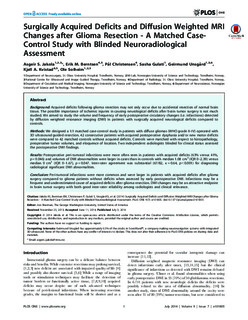| dc.contributor.author | Jakola, Asgeir S | |
| dc.contributor.author | Berntsen, Erik Magnus | |
| dc.contributor.author | Christensen, Pål | |
| dc.contributor.author | Gulati, Sasha | |
| dc.contributor.author | Unsgård, Geirmund | |
| dc.contributor.author | Kvistad, Kjell Arne | |
| dc.contributor.author | Solheim, Ole | |
| dc.date.accessioned | 2015-11-24T12:51:02Z | |
| dc.date.accessioned | 2015-12-08T15:01:21Z | |
| dc.date.available | 2015-11-24T12:51:02Z | |
| dc.date.available | 2015-12-08T15:01:21Z | |
| dc.date.issued | 2014 | |
| dc.identifier.citation | PLoS ONE 2014, 9(7) | nb_NO |
| dc.identifier.issn | 1932-6203 | |
| dc.identifier.uri | http://hdl.handle.net/11250/2367295 | |
| dc.description.abstract | Background:
Acquired deficits following glioma resection may not only occur due to accidental resection of normal brain tissue. The possible importance of ischemic injuries in causing neurological deficits after brain tumor surgery is not much studied. We aimed to study the volume and frequency of early postoperative circulatory changes (i.e. infarctions) detected by diffusion weighted resonance imaging (DWI) in patients with surgically acquired neurological deficits compared to controls.
Methods:
We designed a 1∶1 matched case-control study in patients with diffuse gliomas (WHO grade II–IV) operated with 3D ultrasound guided resection. 42 consecutive patients with acquired postoperative dysphasia and/or new motor deficits were compared to 42 matched controls without acquired deficits. Controls were matched with respect to histopathology, preoperative tumor volumes, and eloquence of location. Two independent radiologists blinded for clinical status assessed the postoperative DWI findings.
Results:
Postoperative peri-tumoral infarctions were more often seen in patients with acquired deficits (63% versus 41%, p = 0.046) and volumes of DWI abnormalities were larger in cases than in controls with median 1.08 cm3 (IQR 0–2.39) versus median 0 cm3 (IQR 0–1.67), p = 0.047. Inter-rater agreement was substantial (67/82, κ = 0.64, p<0.001) for diagnosing radiological significant DWI abnormalities.
Conclusion:
Peri-tumoral infarctions were more common and were larger in patients with acquired deficits after glioma surgery compared to glioma patients without deficits when assessed by early postoperative DWI. Infarctions may be a frequent and underestimated cause of acquired deficits after glioma resection. DWI changes may be an attractive endpoint in brain tumor surgery with both good inter-rater reliability among radiologists and clinical relevance. | nb_NO |
| dc.language.iso | eng | nb_NO |
| dc.publisher | Public Library of Science | nb_NO |
| dc.title | Surgically acquired deficits and diffusion weighted MRI changes after glioma resection - A matched case-control study with blinded neuroradiological assessment | nb_NO |
| dc.type | Journal article | nb_NO |
| dc.type | Peer reviewed | en_GB |
| dc.date.updated | 2015-11-24T12:51:02Z | |
| dc.source.volume | 9 | nb_NO |
| dc.source.journal | PLoS ONE | nb_NO |
| dc.source.issue | 7 | nb_NO |
| dc.identifier.doi | 10.1371/journal.pone.0101805 | |
| dc.identifier.cristin | 1143716 | |
| dc.description.localcode | © 2014 Jakola et al. This is an open-access article distributed under the terms of the Creative Commons Attribution License, which permits unrestricted use, distribution, and reproduction in any medium, provided the original author and source are credited. | nb_NO |
